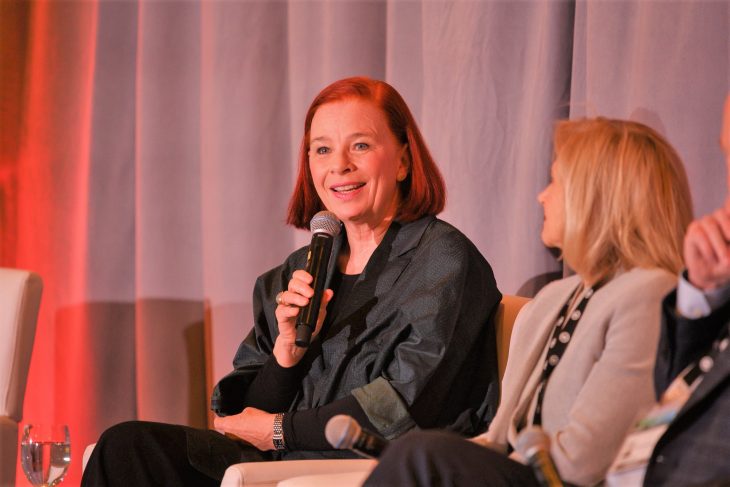
BANFF – It’s a tradition at the BWMF… CBC/Radio-Canada has a huge presence.
But with Catherine Tait, president and CEO, it’s almost personal. “The impact this festival has on our industry and on Canadian creators is unparalleled… here at Banff, and in the days and months beyond this festival, we look to you, the creators, for inspiration… our new three-year strategic plan ‘Your Stories, Taken to Heart’ – will be the engine of brilliant storytelling from Canada to the world,” she said Monday morning.
And we hadn’t even poured our orange juice yet!
At the CBC breakfast Tait continued. “What I’m selling is the promise of public broadcasting,” with the much respected Barb Williams at her side, scant weeks into her new role as EVP of English Services, Tait praises her new personnel acquisition with “I’m still giddy that Barb agreed to come to us… she’s the best in the business.”
Alright, it’s second cup of coffee time.
But the CBC prez has reason to be exclamatory… 16 CBC shows were nominated for Rockie Awards and she’s here (in part) to promote a new MOU partnership with ABC Australia (kids fare, podcasts, etc.) because “How do we assure that we’re not bystanders in the first true global revolution… a $55-billion revolution that creates 630,000 jobs… $18 billion of that is spent by (the FAANGs) on content in 2019… but it’s not devoted to Canadian artists and perspectives… it’s about them leveraging our Canadian market, among hundreds of other countries… so we need to find new partners like ABC Australia… audiences are hungry for authenticity.”
Munching through scrambled eggs, a theme seems to be developing, the CBC can’t put all its eggs in the Netflix et al basket, and just maybe alliances with like-minded pubcasters could be the ticket.
The Australian MOU, while not replete with any legal obligations or dollars yet attached, “is a firm road map (because) public broadcasters need a powerful voice for public media and content… (so) this is hopefully the first of many partnerships with public broadcasters around the world,” she added.
Tait and her team are also here to champion diversity. Looking out over the croissant crowd she smiles and adds, “I see more women here in this room than ever before” and the CBC has now achieved gender parity within its own ranks.
“By 2036, one of every two individuals will be either first or second generation Canadians… so by 2025 at least one key creative role in all our productions must be filled (to reflect this diversity) and this has real implications for independent producers and their pitches.”
At this point Williams adds that “we still need to formalize that (ABC) MOU, and complete financing, but hopefully it leads to more pubcaster deals.”
Emboldened by full tummies, the floor opens to questions from the diners.
What about a co-production treaty with the U.S.?
Not likely says Tait (possibly choking on her bacon) “since the original notion of international co-production treaties was to allow for cooperative projects that could compete with that U.S. giant.”
What about podcasts?
“Well (in case you weren’t paying attention) the CBC is already Canada’s largest podcast player… and since we don’t have ads on radio, podcasting ad revenue is really promising.”
Williams, a very fast eater and learner, adds “we have 20 million podcast downloads per month… we’re strongest in news, but fiction, comedy, are coming along… Radio-Canada is lagging a bit behind the CBC in podcasts.”
(Most likely RC podcasts lag, in my view, because of a relative lack of available content. They’ve got a great platform. BR)
What are you going to do with The Documentary Channel?
Tait’s face tightens a tad, and the room understands the politics of this query.
But she doesn’t miss a beat “We’re living in a time of disruption and turbulence… our doc channel subscription numbers are under pressure… right now (the CBC) is running two businesses – linear TV and radio, and digital media.”
Williams then tosses a well-timed deflective bun with “Gem is an extraordinary opportunity to grow the documentary genre… and younger audiences are getting keener about docs, especially on climate and our socio-political future… (importantly) documentaries retain viewer and brand loyalty.”
“That $300 million is not the risk to Canadian private broadcaster, the risk is from outside Canada, and we need to be clear about that.” – Barbara Williams, CBC
Why don’t you go ad-free on TV?
Good question and yes “The CBC as a commercial free service was considered by the board… but we need funding to be the best broadcaster possible… so ads bring us $300 million in revenue which funds local, northern, women, Indigenous, (multiple) languages, diversity… and over six time zones… my predecessor went to the federal government a couple of years ago to propose a commercial-free CBC/RC… there was no particular appetite.”
Williams, now a top and experienced sous-chef, served up “Driving revenue in the private sector is for shareholder benefit versus ad revenue at the CBC goes to the screen… to what we do… and serves our core mandate… (moreover) that $300 million is not the risk to Canadian private broadcaster, the risk is from outside Canada, and we need to be clear about that.”
What does diversity mean?
“It means many things in our new plan,” said Tait. “It’s about “customizing services, being local, reflecting contemporary Canada.”
Michel Bissonnette, EVP French Networks, who had been offering sage side-orders throughout, made an emphatic and well-received pitch that “diversity means diverse points of view… it also means less Toronto- and Montreal-centric.”
With that, minds start turning to lunch and a few BWMF master classes, super panels, partner presentations, and matters of social networking to help digest.
The last word is deservedly Tait’s “As your public broadcaster we are your home… We are your champion… CBC/RC is committed to nurturing creators in this country each and ever day.”
Words to dine out on.
Photo by Kristian Bogner



